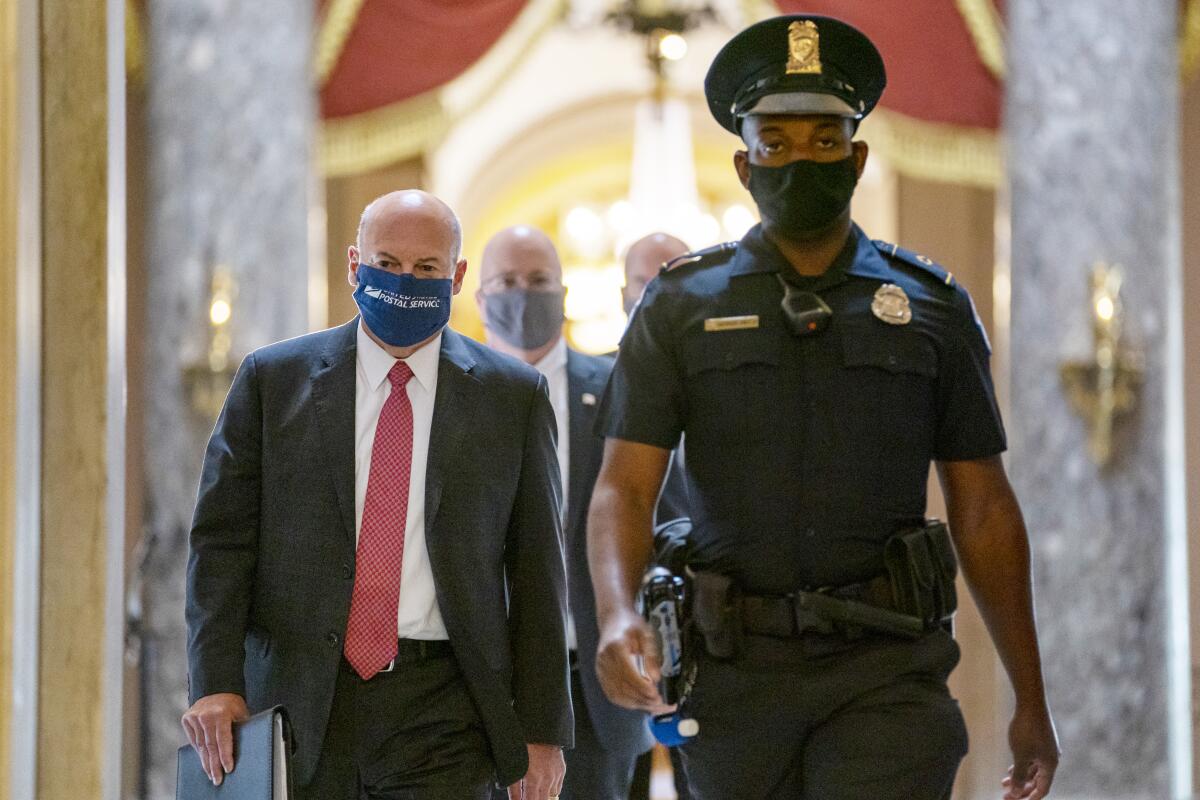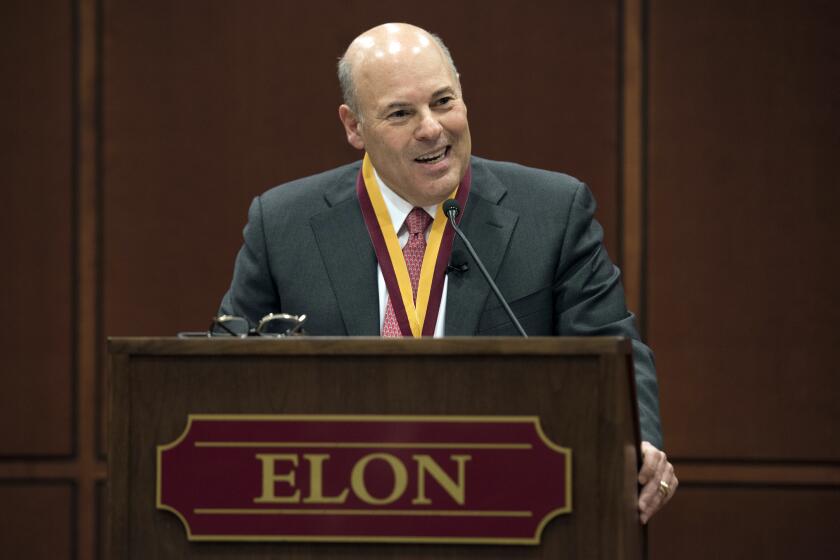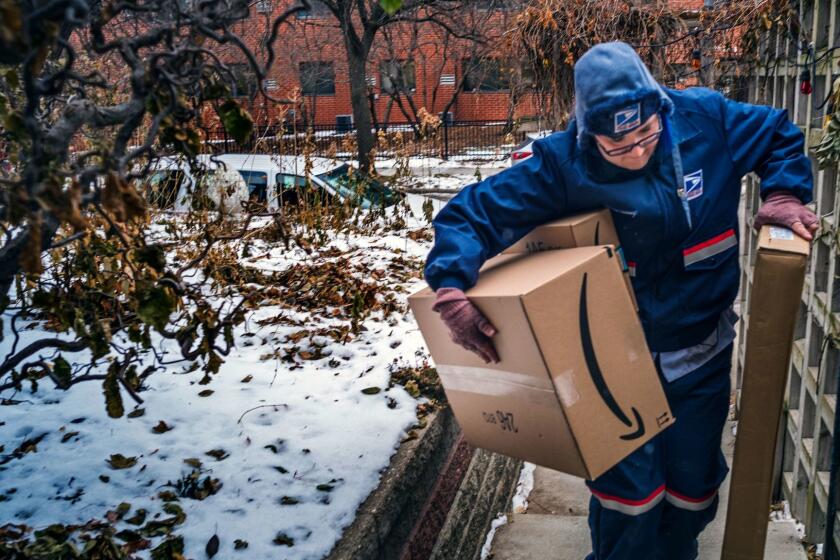Don’t relax yet. Trump still poses a mortal threat to the USPS, and the election

- Share via
Postmaster General Louis DeJoy attempted to quell the expanding uproar over indications that his management decisions at the U.S. Postal Service could negatively affect voting this fall by announcing Tuesday that he is putting those changes on hold.
Don’t breathe easy yet. President Trump and his appointees still have the ability to hamstring the USPS as the election draws near.
Nothing that DeJoy said changes that. In fact, in recent weeks, the Trump administration has tightened its grip on postal operations by saddling the USPS with onerous terms for a $10-billion lifeline passed by Congress.
The Postmaster General frankly admitted that he had no intention of replacing the sorting machines, blue mailboxes and other key mail infrastructure that have been removed and that plans for adequate overtime, which is critical for the timely delivery of mail, are not in the works.
— House Speaker Nancy Pelosi after talking with Postmaster General DeJoy Wednesday
DeJoy said that he would suspend changes in retail hours at post offices and closures of mail processing facilities until after the election. He said mail processing equipment and mailboxes will “remain where they are.” Overtime, which Dejoy had suspended, henceforth will be “approved as needed,” he said.
All those changes feed into public fears that DeJoy, a major Republican campaign donor and fundraiser who was appointed to his job in May, has taken steps that would reduce USPS efficiency in ways that would interfere with an expected surge in mail-in ballots this year.
DeJoy is scheduled to testify before a House committee next week. Several states have also moved to sue DeJoy and Trump over the alleged mismanagement of the USPS and the possibility that it’s aimed at making voting by mail less effective.
Washington and 13 other states filed the first of these lawsuits in federal court Tuesday, asserting that DeJoy’s initiatives were illegal because he didn’t consult first with the Postal Rate Commission or offer the public an opportunity to comment.
DeJoy’s statement didn’t satisfy everybody. “It raises more questions than it provides answers,” former Deputy Postmaster General Ronald Stroman, who announced his retirement only weeks before Dejoy’s arrival, said in a news conference sponsored by the Democracy Fund, where he is now a fellow.
Stroman observed that DeJoy didn’t promise that steps he had already taken would be rescinded.
Trump’s attack on the U.S. Postal Service goes beyond vandalism and undermines democracy.
“The question becomes, if you’ve already changed hours, will those hours be reversed? ... If you’ve already dismantled or removed some of that equipment, the fact that it’s remaining as it is doesn’t mean that you’re going to reassemble that equipment or return it .... We just don’t know.”
We know now. House Speaker Nancy Pelosi revealed after speaking with DeJoy Wednesday that “the Postmaster General frankly admitted that he had no intention of replacing the sorting machines, blue mailboxes and other key mail infrastructure that have been removed and that plans for adequate overtime, which is critical for the timely delivery of mail, are not in the works.”
Stroman also took issue with Dejoy’s description of his original decisions as reflecting “longstanding operational initiatives ... that predate my arrival at the Postal Service.”
Stroman said that some of those initiatives were under consideration previously, but were taken off the table by the postal service board of directors once the coronavirus pandemic took hold and in anticipation of “a national election where you will have an exponential increase in absentee ballots.”
He said that “unless these were implemented in the two weeks between the time I left and the time that the new PMG [postmaster general] arrived, these were not implemented.”
Nor did DeJoy mention a policy change reported by several state election officials barring postal carriers from acting as witnesses for people preparing mail-in or absentee ballots.
A USPS spokesman told Alaska elections officials that the rule was imposed “due to the potential operational impacts.” He said the postal service doesn’t bar employees from serving as witnesses on their own time.
Yet as the USPS itself acknowledges, according to the Anchorage Daily News, some states “specifically authorize USPS employees to provide a witness signature on ballot envelopes.”
Trump is threatening the USPS with privatization, but that’s a terrible idea.
The biggest problem with DeJoy’s approach is that it undermines the USPS’ longstanding approach to election-related mail, which is proactive. In the past, according to a 2019 report by the USPS inspector general, post office officials have met with state elections officials to anticipate and work out any potential glitches well in advance of election day.
That hasn’t happened this time around, postal experts say. Instead, the USPS notified officials in 46 states that it might not be able to meet the deadlines for receiving and validating mail ballots.
In the past, the postal service has aimed to deliver all election mail by first-class standards — delivery within one to three days — regardless of the paid class of service.
This time, according to the Washington lawsuit, state officials have been warned that they must pay first-class mail rates if they want first-class service. That could nearly treble the cost of mailing out ballots, to 55 cents per piece from the 20-cent marketing mail rate states are accustomed to.
As we’ve reported before, the losses sustained by the USPS in recent years have something to do with the decline of first-class mail volumes, but more to do with a 2006 congressional mandate requiring it to prepay retiree healthcare costs expected to occur well into the future — a mandate that has been applied to no other federal agency.
President Trump lies again about the reasons for the Postal Service deficit
Without this burden, according to the Institute for Policy Studies, “the Post Office would have reported operating profits in each of the last six years.” Instead, “This extraordinary mandate created a financial ‘crisis’ that has been used to justify harmful service cuts and even calls for postal privatization.”
Privatizing the USPS has been in the wind from the outset of the Trump administration, part of a long-term conservative goal to turn crucial government services over to private enterprise.
Congress responded to the unique demands on the service’s operations by providing it with a $10-billion line of credit as part of a coronavirus relief bill in March. But as ably explicated by David Dayen of the American Prospect, Congress unwisely capitulated to the demand by Treasury Secretary Steven T. Mnuchin for a say in how the funds are disbursed.
The result is a term sheet that renders the credit all but unusable, except under conditions that allow Treasury to interfere in the USPS.
The terms state that the USPS can’t draw down the funds unless its cash on hand totals less than $8 billion. That figure is currently $12.9 billion. What’s important is that it’s well under the control of DeJoy, who can keep it over $8 billion by cutting expenses, regardless of whether those cuts will result in service delays.
Even if the post office can access the funds, it can’t draw down more than would be needed for 30 days of its cash needs. That means the money probably can’t be used for longer-term investments, such as for new technology.
Most troubling, as a condition to agreeing to the line of credit, Treasury demanded and received a report identifying the 10 largest negotiated service agreements with major shippers.
Taking advantage of his prerogative to comment on issues of government about which he has no apparent knowledge, President Trump last week Twitter-attacked the U.S.
This gives the Trump administration window into contracts likely to involve shippers such as the United Parcel Service, FedEx and especially Amazon.com. Trump has been on the warpath over these deals — particularly the one with Amazon, which is controlled by Jeff Bezos, who also owns the Washington Post, a source of troublesome Trump criticism.
Trump has claimed, inaccurately, that Amazon benefits from a sweetheart deal with the USPS, and he has advocated raising the contractor prices.
There is no reason for Treasury to play any role at all in the USPS, which is under the jurisdiction of a board of governors and the Postal Rate Commission.
Trump has claimed that he has had no authority over the postal service, because it’s run by independent boards “appointed by other administrations.” This is a lie. The truth is that every one of the six sitting members of the USPS board of governors is a Trump appointee. Three seats are vacant. The board selected DeJoy, the first postmaster general in decades to have had no postal experience. DeJoy’s financial holdings bristle with potential conflicts of interest.
As the Washington state lawsuit observes, Dejoy’s initiatives might not have created as much of a furor had not Trump explicitly tied the hamstringing of postal operations to a desire to undermine voting by mail.
“Since the spring of 2020,” the lawsuit observes, Trump “has attacked mail voting more than 70 times in interviews, remarks, and tweets. He has railed about supposed massive fraud in voting by mail without supporting evidence.” He also has expressed the intention to block emergency funding for the USPS so “you can’t have universal mail-in voting because they [USPS] are not equipped to have it.”
DeJoy’s statement, therefore, is merely a first, modest step in making sure that the USPS performs its proper role in making sure that every American can vote. There’s still a lot of work to be done to protect it.
More to Read
Inside the business of entertainment
The Wide Shot brings you news, analysis and insights on everything from streaming wars to production — and what it all means for the future.
You may occasionally receive promotional content from the Los Angeles Times.













